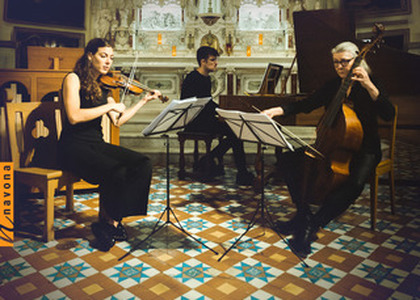Disk of 2023 > Classic

Spinoza ensemble. Dietrich Buxtehude - CD Review, November 14th, 2023
Spinoza ensemble. Dietrich Buxtehude - CD Review, November 14th, 2023
Dietrich Buxtehude - Trio sonatas op. 1
Debut album, released on October 13th
Dietrich Buxtehude's seven Trio Sonatas Op. 1 are included on violinist Noémy Gagnon-Lafrenais's debut album, who is a young artist from Quebec, specialized in playing classical music on period instruments, and creator of the Spinoza ensemble in 2020 together with Canadian harpsichordist Christophe Gauthier. A year later the famous musician Margaret Little joined the group on la viola da gamba; she's a musician with a vast concert activity and professor since 1992 at the University of Montreal. The ensemble's goal is to discover jewels of the baroque repertoire and bring them to North America's public eye. Such music, so little explored yet so valuable belongs to Dietrich Buxtehude, Danish artist of German origins who lived between 1637-1707 and who was one of the most influential composers of those times, being an inspiration to Johann Sebastian Bach și Georg Friedrich Händel. From 1688 on he was organist at Saint Mary's church in Lübeck and he created a vast number of sacred sonatas, as well as pieces for organ and chamber music.
If composer Dietrich Buxtehude's sacred works and those for the organ are popular among baroque lovers, his chamber music is less known. At the end of the 17th century, at the climax of his career, the composer published two collections, each made of seven sonatas for violin, viola da gamba and continuous bass. The first set is included on the CD released on October 13th, 2023 by Spinoza ensemble through Navona Records. The Op. 1 collection published in 1694 is impressive through its innovative style, the instrumental dialogues and the innovative counterpoint structures in those times, by combining baroque elements from North Germany, Italy and France. The Spinoza ensemble plays these extraordinary pieces in an authentic baroque style, well documented, using period instruments and highlighting the musical expressiveness of Dietrich Buxtehude's music.
Translated by Denisa Stanciu,
University of Bucharest, Faculty of Foreign Languages and Literatures, MTTLC, year II
Corrected by Silvia Petrescu














